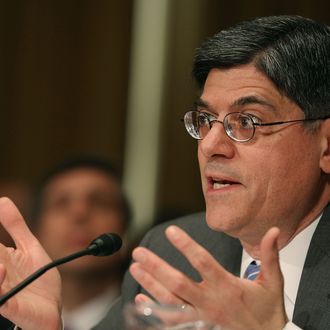
Conspiracy theories about the Wall Street–Washington revolving door are tempting for people who instinctively distrust both the political and financial sectors, so it’s no surprise that the “Jack Lew Got a Bonus From Citigroup to Work in Government” story that originated in Jonathan Weil’s Bloomberg “View” column and the editorial pages of The Wall Street Journal — and which I tried to debunk yesterday — has become a full-fledged Facebook meme.
The theory — which holds that Treasury Secretary nominee Jack Lew, who worked at Citigroup for two years beginning in 2006, was given a bonus for leaving his job to go to a high-ranking post in the federal government, in a shady deal that amounts to a “bounty” or a “golden parachute” meant to ease Citigroup’s dealings in the public sector — is clearly gaining steam, and may even come up again before Lew’s full Senate vote, scheduled for later this week.
But it’s false, so let’s put it to bed.
The real story is that Lew, knowing he was going to go back to government after a short stint in finance, insisted on putting a clause into his own contract as part of his deal to come to the bank. The clause allowed him to keep the bonus money he’d already accrued, in the event that he was offered a “high level position with the United States government or regulatory body” and chose to accept it.
A source close to Citigroup confirmed this version of events with me, saying, “It’s my understanding that he negotiated his employment agreement.”
That jibes with what Lew himself said about the contract clause in a written response to questions posed by ranking Senate Finance Committee Republican Orrin Hatch:
“Given my long history of public service, and interest in potentially returning to it, I sought this provision. I believe Citigroup agreed to include it, because such an agreement was consistent with Citigroup’s goal of using deferred compensation, such as the vesting of stock compensation over time, to discourage employees from leaving and joining competitors.”
Weil is sticking to his guns, and saying that “the wording of the pay clause makes it seem as if Citigroup might have agreed to award Lew some sort of a bounty to seek out, and be appointed to, a top U.S. government position.” But this is not what it says. What Lew’s contract says is that if Lew decided to go back to government, he would simply not have to forfeit the bonus money he had already been paid.
On Wall Street, these kinds of keep-your-bonus exemptions are very common. They’re given by default to most bankers who leave their jobs on good terms, for reasons other than going to work for a competing firm. In Lew’s case, the bank agreed to let him keep his bonus if he quit because they substantially downgraded his title, made him report to anyone other than the CEO of his unit, moved his job far away from New York, or left to take a high-ranking post in the federal government. These situations weren’t “bounties” — they were instances in which Lew wouldn’t be punished for quitting.
So why, Weil asks, didn’t Lew’s contract also let him keep his bonus in the case that he left to run a charity or do some other kind of nonprofit work? Well, as Lew himself said, he had no intention of running a charity. In 2006, when he signed his contract, Lew knew he was eventually going to go back to politics, especially if a Democrat was elected president in 2008. He wanted to make sure he could leave at the drop of a hat if a spot opened up, without paying a huge financial price.
Lew might not have even needed the clause in order to keep his bonus when he left — these things are largely discretionary and banks can, and do, allow employees to keep their deferred compensation after leaving all the time, for all manner of reasons. But Lew wanted to see the “high-level political job” clause in ink, and he had the leverage to demand it, so he got Citigroup to put it in, just to make certain he was covered.
So while legitimate questions may remain about Lew’s compensation at NYU (where he worked immediately before Citigroup), we should consider his Citigroup exit package a non-story. At most, it proves that Lew is a savvy negotiator — a skill that will come in handy when he is confirmed as Treasury Secretary.





























